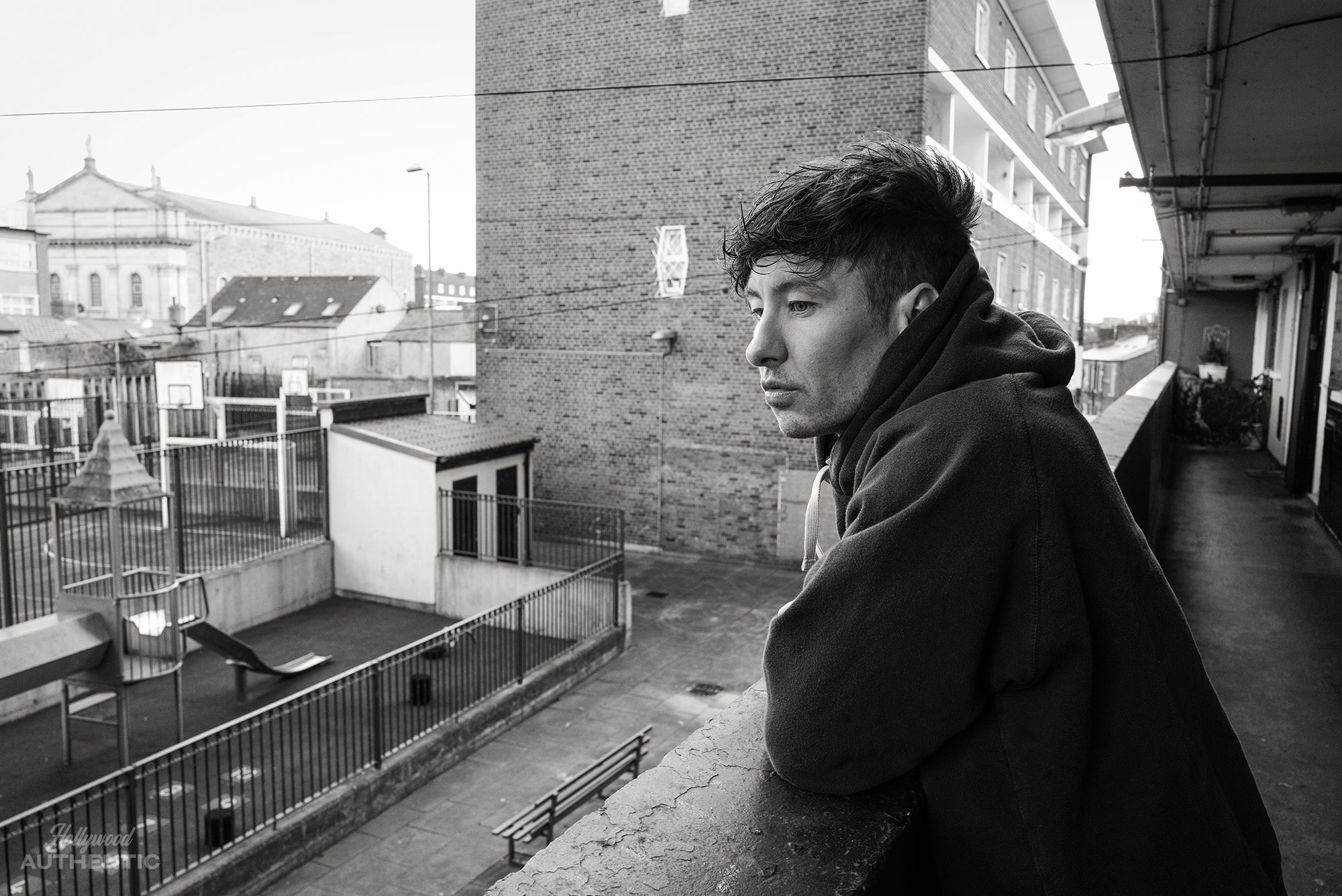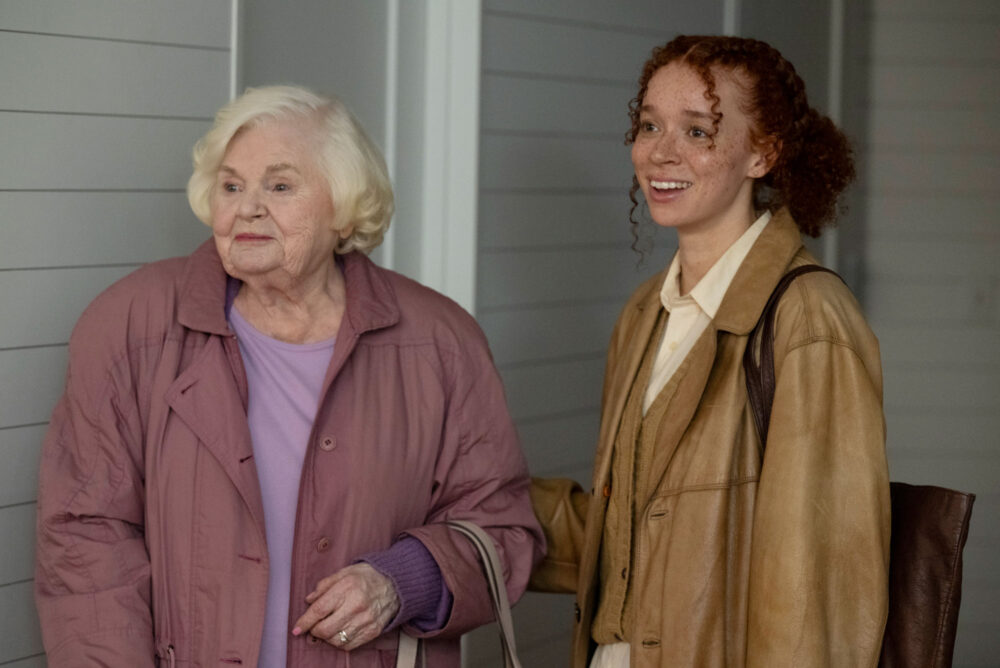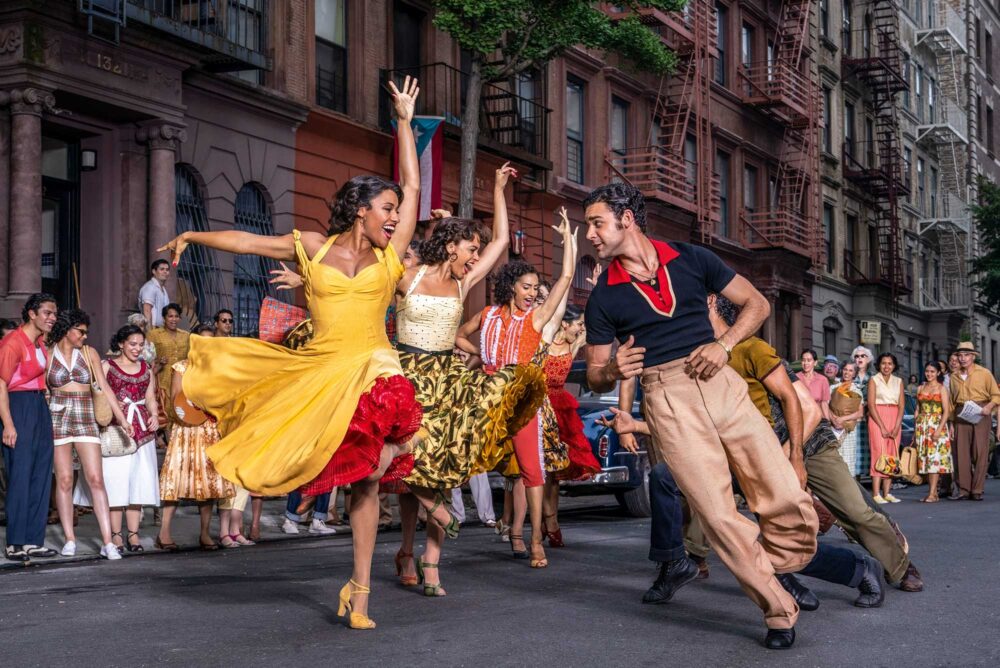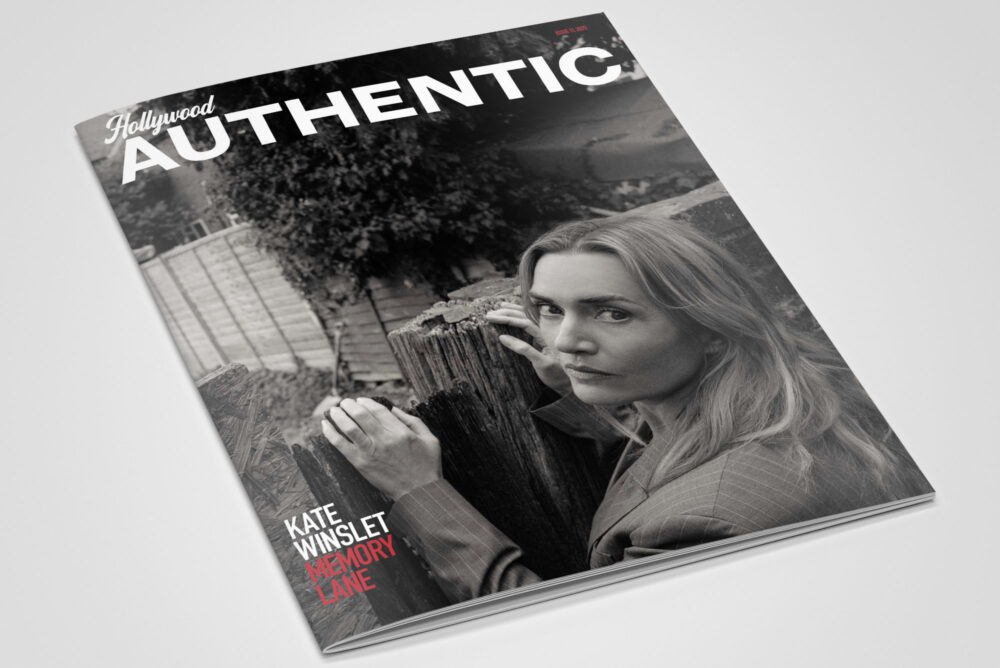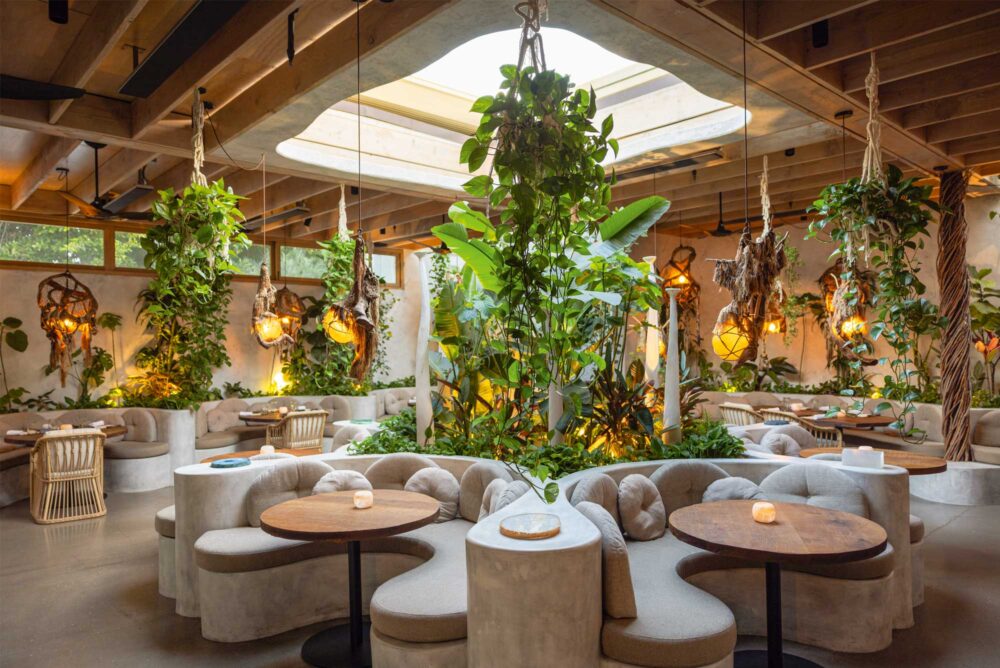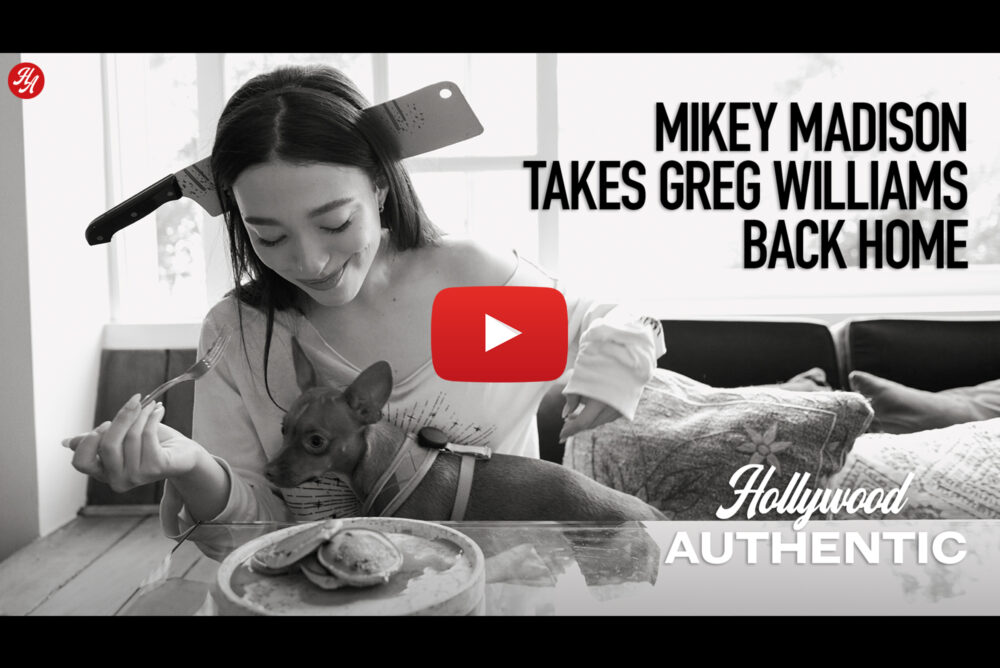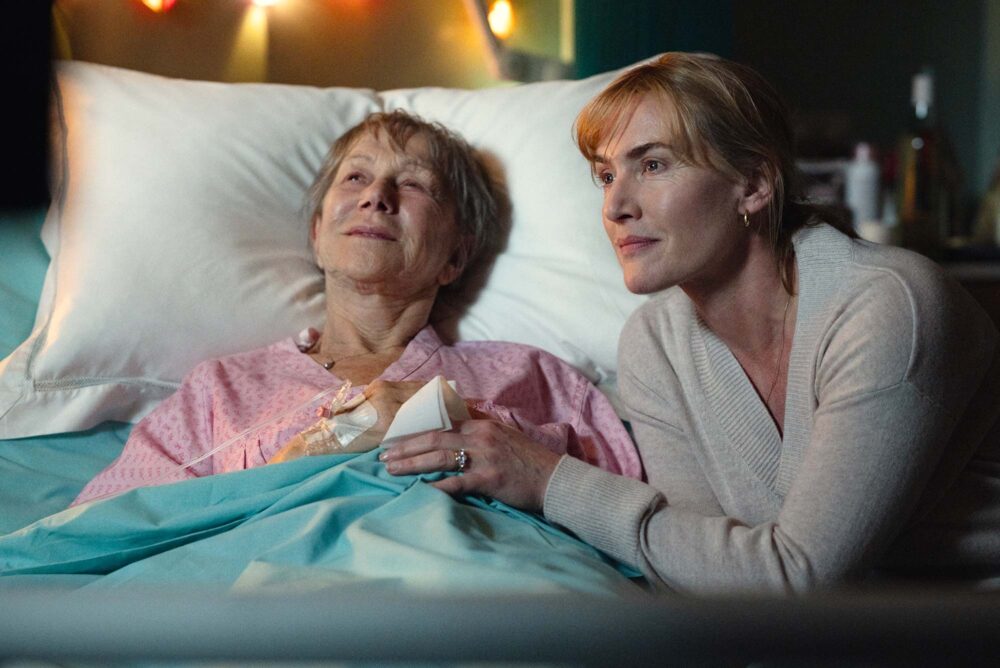Photographs & interview by GREG WILLIAMS
As told to JANE CROWTHER
Greg Williams travels to Dublin with Barry Keoghan as they explore the actor’s tough childhood and the challenging moments that shaped him.

As we hang out in a suite at a luxury Merrion Hotel in Dublin in early March, Barry Keoghan is reminding me of another time, over a year ago, when we were together at the Governor’s Ball in LA. ‘That was different back then, wasn’t it?’ he says. It certainly was. Back then, Keoghan was racing around the world in a blur of promotion and awards season, seemingly having the time of his life. But today, he reveals that not everything was all as it seemed. I’ve known Barry for a number of years, and discussed a deep-dive interview like this one many times, but as his trajectory rose with affecting and nuanced performances in films such as Dunkirk, American Animals, The Banshees of Inisherin and Saltburn, the opportunity to talk properly became more difficult. And so did his personal life. Now, back home in Ireland and fighting fit, Barry wants to take me on a tour of his city and the formative places he grew up, and on that journey I discover heartbreaking moments that inform his acting and the past that coalesced in a moment when he realised he had to change how he was living.

I ice the face because Paul Newman used to do it
Before we hit the road, Barry ices his face in the bathroom sink. ‘I ice the face because Paul Newman used to do it,’ he explains with a cheeky smile before blasting the hairdryer. He’s been to sportswear store JD Sports to pick out hoodies and trainers like he used to wear as a kid and is revelling in the time-travel aspect of this as his younger brother, Eric, joins us, along with his old friend, Taylor. The hotel, Barry notes, is on the same square as Dublin’s Natural History Museum. ‘There’s more history in this room, here, than there is out there,’ Barry says fondly. We’re going to delve into that history on this trip.

We all set off with Barry’s trusted driver, Niall, to tour around the spots in Dublin that formed the 32-year-old actor. It’s a bright sunny day as the brothers discuss where they should start. As the kids of a mother who died from heroin addiction, they spent many years of their childhood in and out of foster homes, and we pass the foster care office near Croke Park where they used to be picked up by a series of new foster parents (the brothers lived in 14 different homes between the ages of five and nine). On the way, we drive past a murky body of water, Dublin’s quay, and the actor laughs. ‘We used to jump in over there. We all got this green shit coming out of here [he indicates to his ear]. We went to the doctor. The doctor was like, “Are you jumping into the quay as well?” Everyone had green pus…’
When we get to a spot overlooking the 80,000-seater Croke Park football stadium in the north of the city, we get out of the car to take a look. Barry is good at soccer and boxing, but Gaelic football isn’t his thing. ‘I don’t have the patience for it. Just kick the ball, will you?’ he chuckles. He looks down on the streets surrounding the stadium. ‘This area, it shaped me. Sheriff Street and East Wall. This is all Dublin One. Up there, where Croke Park is, that’s my area. But this is the docklands. My granddad used to live down here, in all of these areas. I’ve spent many times down here – many nights, many fights. Yeah, it’s amazing, this place.’ Barry’s grandfather was a dockworker who died at 54, leaving behind 10 children and a wife, Barry’s beloved nannie, Patty, who we’ll be meeting with later.

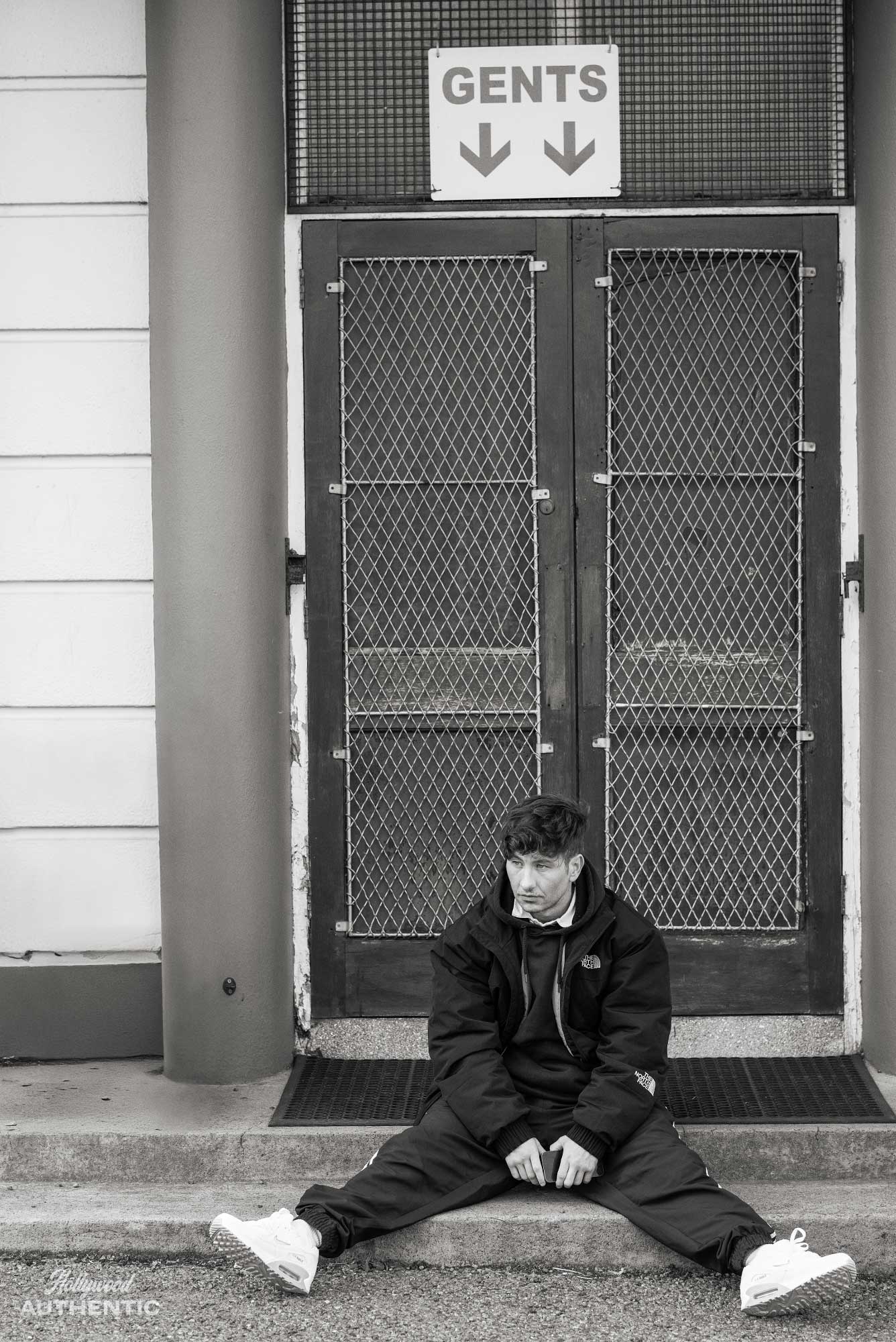
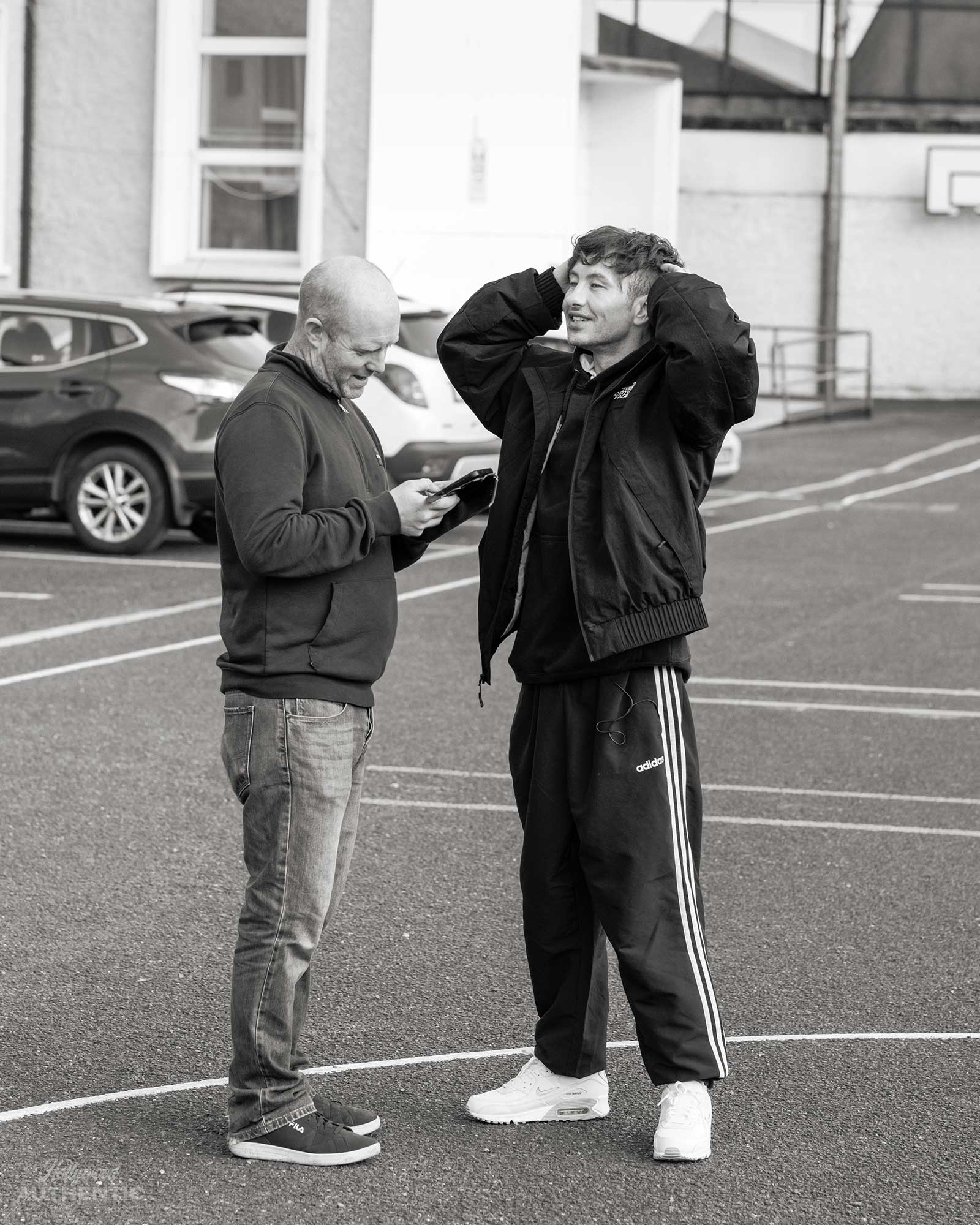
It’s where I started my acting. Then they banned me from doing plays because I was bold. Misbehaving. Whatever you want to call it
We jump back into the car to head down to Croke Park, past a house Barry used to live in with his mum as a little child, the flats he stayed in later as a teen, the church he got communion in and his former primary and secondary school, O’Connell. ‘It’s where I started my acting. Then they banned me from doing plays because I was bold. Misbehaving. Whatever you want to call it.’ We stop at the school and get out of the car for a look around, with Barry pointing out the PE hall where he performed in drama, the area he liked to play football. ‘This is where I did my first Christmas play. It was Oliver!,’ he recalls as the deputy headteacher comes out of the building to greet him. Barry’s presence soon brings more well wishers who want photos with the former pupil. ‘Local boy done good,’ says a teacher proudly. ‘He’s an inspiration to all the kids around here. For everyone around here.’ ‘If we only knew that when he was here!’ jokes another. It’s clear to me that Barry was a handful. He starts talking about schoolyard fights. I ask him how many he had. ‘150!’ How many did you win? ‘160!’ Barry happily takes pictures with staff and pupils. ‘It wasn’t like this when I was here,’ he laughs. ‘I’d be getting told to leave!’

When we can tear ourselves away, Barry talks about the daft things he’d get up to as a kid and regales me with tales of mischief. We walk down a street that he tells me is infamous for shootings where local rule means that those not from there are not allowed. ‘You wouldn’t get in, Greg,’ Eric nods. I feel safe in their presence. ‘This street has a lot of history,’ Barry says. ‘Stephen Gately [from Boyzone] came up there, and Colin Farrell, Jim Sheridan, the filmmaker. The boxer Kellie Harrington, The footballer Troy Parrott – I mean, there’s loads of talent. I played football for Sheriff Youth Club.’ His friend, Taylor, knows Barry from those days. ‘We got to know each other through youth clubs,’ Barry explains. ‘We’re kind of similar but from different areas. But our mums passed early. So we have similar backgrounds, and we’re both into acting. We just stayed close. We’d stand there together on this tower, that I’m going to show you, at four in the morning, just talking about how proud our mothers would be, and just talking about ringing Colin Farrell…’ He later got to act opposite the fellow Irishman in The Killing of a Sacred Deer and The Banshees of Inisherin. Farrell has, he says, ‘always been there. Even now, through the tough times and good times. And so has Cillian [Murphy].’

The next day we travel to Nannie’s home, where he and Eric lived from the age of nine. Niall picks us up again and Barry tells me about their special relationship, which extends beyond Niall merely piloting his car. Having had a meteoric rise after a starmaking turn in Irish indie film Between the Canals in 2010, Barry went on to high-profile projects with storied directors: Yorgos Lanthimos’ The Killing of a Sacred Deer, Christopher Nolan’s Dunkirk, Bart Layton’s American Animals, David Lowery’s The Green Knight, Martin McDonagh’s The Banshees of Inisherin (which netted him an Oscar nomination for best supporting actor), Emerald Fennell’s Saltburn. He tore up the small screen in Top Boy and Masters of the Air and wowed Cannes with Bird. His career could not have been going better. And in his personal life he welcomed a baby boy, Brando, in August 2022. But Barry was privately struggling. He is open about his quest for sobriety. ‘Niall literally drove me and put me on a plane himself, came with me and brought me to the rehab in England. I went back to visit. It was nice to see the staff again, and for them to see the change in me. They were quite emotional about it. I’m forever grateful. When I say that Niall is the best, I mean it, because no one else put me on the plane, by the hand, literally got on the plane with me.’

This street has a lot of history. Stephen Gately [from Boyzone] came up there, and Colin Farrell, Jim Sheridan, the filmmaker. The boxer Kellie Harrington, The footballer Troy Parrott – I mean, there’s loads of talent
As we drive, Barry tells me about skipping school and the trouble he got into as a teen, the youth clubs that used to feed him and his brother when they’d missed meals at home. ‘It was a full circle yesterday, seeing that teacher come out from school,’ he admits. ‘But I don’t think acting got nurtured enough. When I said I wanted to be an actor, I wasn’t taken seriously. It was more like, “OK, we’re going to send you to study drama and all that.” I went, “But that’s not what I want to do. I want to do practical. I don’t feel you can learn acting.” And that was always the Plan B to them. They were like, “But what’s your Plan A?” I was like, “That is my Plan A. I don’t have a Plan B.” It was such a far reach for people to think of me being an actor.’

As a kid, living with his nannie after unstable years in and out of foster homes, Barry dreamt of acting while watching classics. ‘I’d watch these movies at my nannie’s at night-time like Cool Hand Luke and Marlon Brando movies. That was my way of learning behaviour from men. Because I didn’t have a father figure. I was looking at these men, and how they behaved. I was very fixated on how they just moved, and had composure. I didn’t have someone in the house showing me how to shave, or saying, “Don’t punch someone in the balls.” I had an uncle, Alan – he passed away. Heroin. He was my nannie’s boy. He was very present for us for a good few years. He was my mum’s brother. But he passed away. He was only 40. He had an overdose.’

Downstairs is the only bit of light I feel left here for me. It’s that bulb downstairs, which is my nannie and that
Barry’s grandmother lost three of her 10 children to drugs. His mother, Debbie, the second youngest, was tragically one of them. In the wake of that seismic event, Barry was a kid dealing with grief and poverty, looking for a way to act. He found it one day, in an ad in a shop window. ‘Kathleen’s is a shop where I’d seen my first acting notice,’ he explains as he urges Niall to drive to the shop. Standing outside, near to a statue in remembrance of those who have died from heroin, Barry shivers slightly in the crisp air. ‘I used to come from my youth club. My boxing club was there. So I came here, and I’d seen it. It basically said they were looking for non-actors. They were looking for kids who have scramblers and bikes. I took the number. I literally went and rang it up on my nannie’s phone. I remember the call saying, “Yeah, yeah. We’re just waiting on finance.” I was like, “What does that even mean?” I was just ringing it because you’d get paid 120 Euros. But I knew I wanted to try it. I was like, “I could be in a movie.”’

I’d watch these movies at my nannie’s at night-time like Cool Hand Luke and Marlon Brando movies. That was my way of learning behaviour from men. Because I didn’t have a father figure
He got his wish. A role as a Sheriff Street kid in crime drama Between the Canals kicked off a career and eventually took him away from here. We travel on, past the chip shop, and a meeting with two local women who stop us to tell Barry all the news. We pass the youth club he, his brother and Taylor used to go to, the disused old folks’ home where they used to camp out, the house doors they used to kick, playing ‘knick-knack’ (a version of Doorbell Ditch or Knock Down Ginger); ‘We used to run along and kick every single door, and get chased.’ We arrive at the block of flats where they lived for a while. ‘Come on, into the tower,’ Barry invites as he ducks into a stairwell, a wide spiral staircase leading up to each floor of his block. ‘I used to look out here in the morning,’ he says, peering through a window across the city. ‘I sprayed my name here. Baz…’

We arrive at the boys’ nannie’s house where they are both greeted with delight and hugs. Barry sits next to his nannie to catch up on local gossip and she sings us all an Irish song to great praise, before he shows me round the flat. It’s a two-bedroom but at one time had 12 people living under the roof when the Keoghan brothers finally arrived after more than a year of social services vetting. Barry leads me upstairs to the room he used to sleep in. His aunt has handed him his mum’s diary, which she journalled in most nights in the days leading up to her death in 2003, after a period in rehab. He’s seen photos of it before but never held it. He opens it carefully. He reads some of the entries aloud from it. One reads: ‘Well, tonight went okay for me so I hope I have the strength to not touch anything tomorrow.’ It’s heartbreaking. ‘I got to read that at Christmas. I sent a picture to my brother, because he was in rehab over Christmas. I sent him that picture of her last page. I said, “Just look at that. You’ve got a chance now.” You can feel the pain in this.’


I got to read that [his mum’s diary] at Christmas. I sent a picture to my brother, because he was in rehab over Christmas. I sent him that picture of her last page. I said, ‘Just look at that. You’ve got a chance now.’ You can feel the pain in this
He looks around the room. ‘We had bunk beds. We had a PlayStation… I’d always leave that window open, because I loved the noise of all the fighting outside, and all the windows going through, and the fucking arguments you hear. That, for me, would be peaceful. Actually, I might stay here tonight.’ He calls down the stairs, asking if he can stay. His cousin, Gemma, who now lives in the room, shouts no, it’s her room. He laughs. His mum’s diary makes him think about addiction again. ‘I remember being kids here and hearing my mum scream through the letterbox, asking for us, while she’s battling addiction, while she’s looking for money to score. And we were just told to stay in bed. We weren’t to go down and hug her.’ His honesty and pain brings tears to my eyes and I tell him so. I can’t imagine my own child going through this.
‘I’m not in denial anymore. I understand that I do have an addiction, and I am an addict. You know, when you accept that, you finally can move on, and learn to work with it.
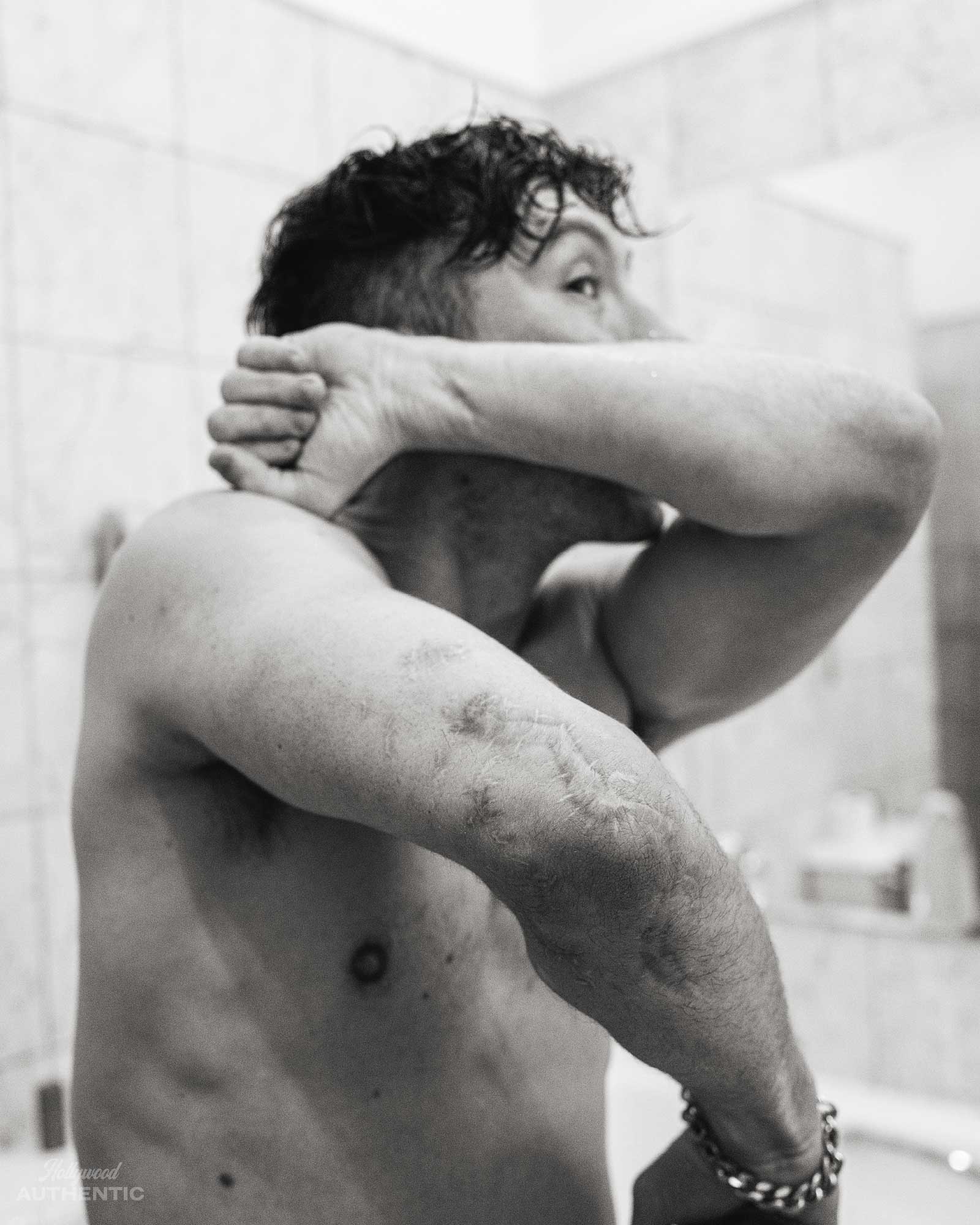
I apologise too, mainly to myself more than anything else for all the pain I’ve put people and myself through
‘My father passed away as a result of similar and I lost my mum to it. I’ve lost two uncles and a cousin to drugs. That should be enough to go, “OK, if I dabble here, I’m fucked.” But your curiosity is a powerful thing. Sometimes it’s beneficial, and sometimes it’s detrimental. For me, it was detrimental. Even my own son coming into this world didn’t stop me from being curious. You know, you go to LA, you go to Hollywood, wherever the big scene is. There’s an enormous amount of pressure, and a different lifestyle that is good and bad for you. You’re around the scene. You just happen to be the one that ends up doing it.’ He pulls up his sleeves to show me marks on his arms from injuries sustained while high. ‘I’ve got scars here to literally prove it. They’re a result of using. I’m at peace now, and responsible for everything that I do. I’m accepting. I’m present. I’m content. I’m a father. I’m getting to just see that haze that was once there – it’s just a bit sharper now, and colourful.’ I tell Barry I’ve seen a huge change in him. ‘Thanks man. I feel like I’ve arrived. I apologise, too, mainly to myself more than anything else for all the pain I’ve put people and myself through.’
“Downstairs is the only bit of light I feel left here for me. It’s that bulb downstairs, which is my Nannie and that. But there’s amazing people around here who have suffered a lot… I just want people to get an insight into where I come from. I’m very proud to carry that, and for people out in the acting world and the industry to understand that there’s a lot weighing on this.’
He puts the diary away, carefully, reverentially, and we go back downstairs to the lounge filled with chatter and warmth. I ask Eric what kind of brother Barry was growing up. ‘We were partners. But when push came to shove, he would be my protector. He still is. I look to him as a father figure type of thing. And he’s helped me. When we were kids [social services] tried to separate me and Barry because no one wants to take two kids together. It was complex but they kept us together… We were inseparable for years. Even when it came to fighting. If one of us was fighting, the other person would be fighting as well’.
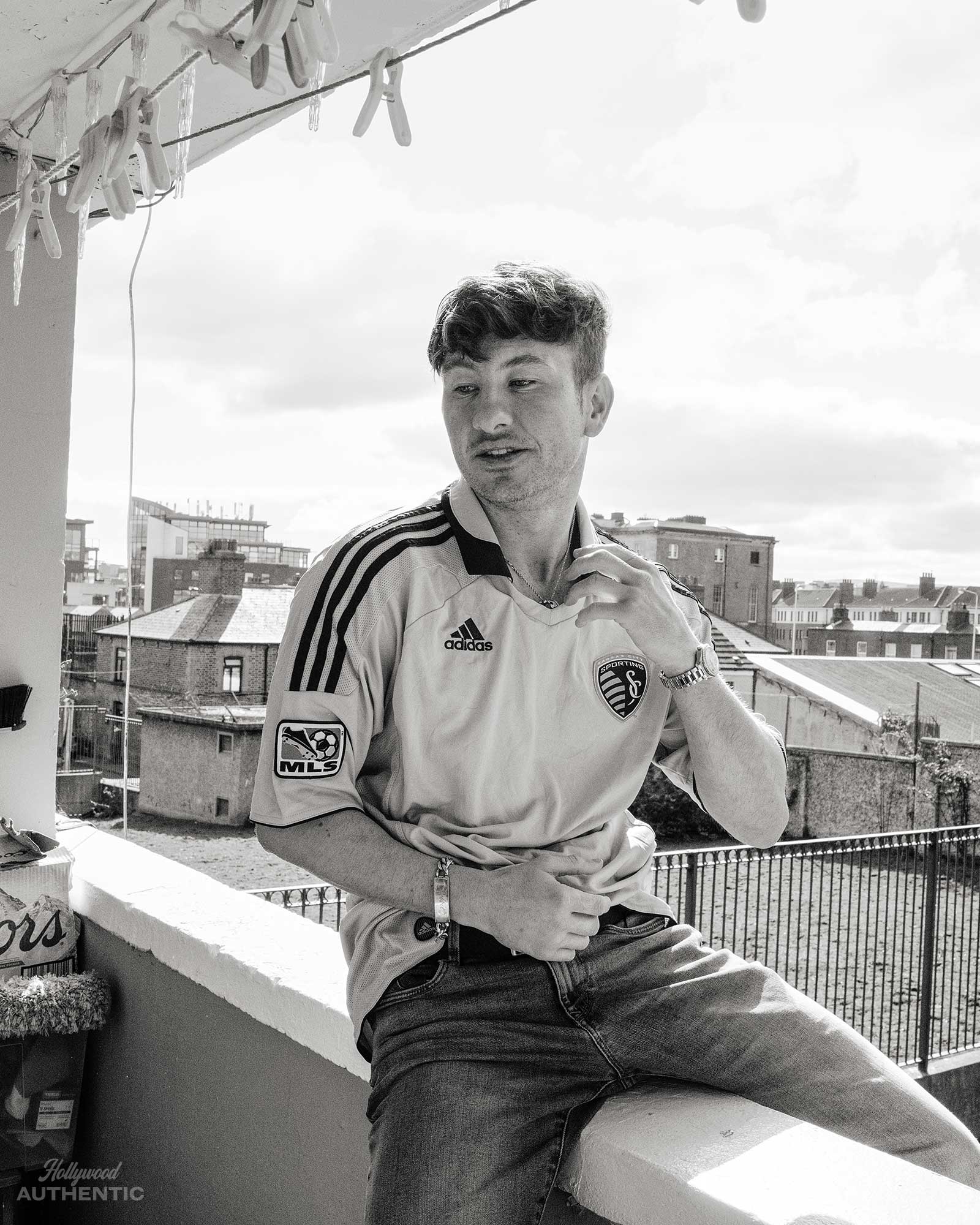
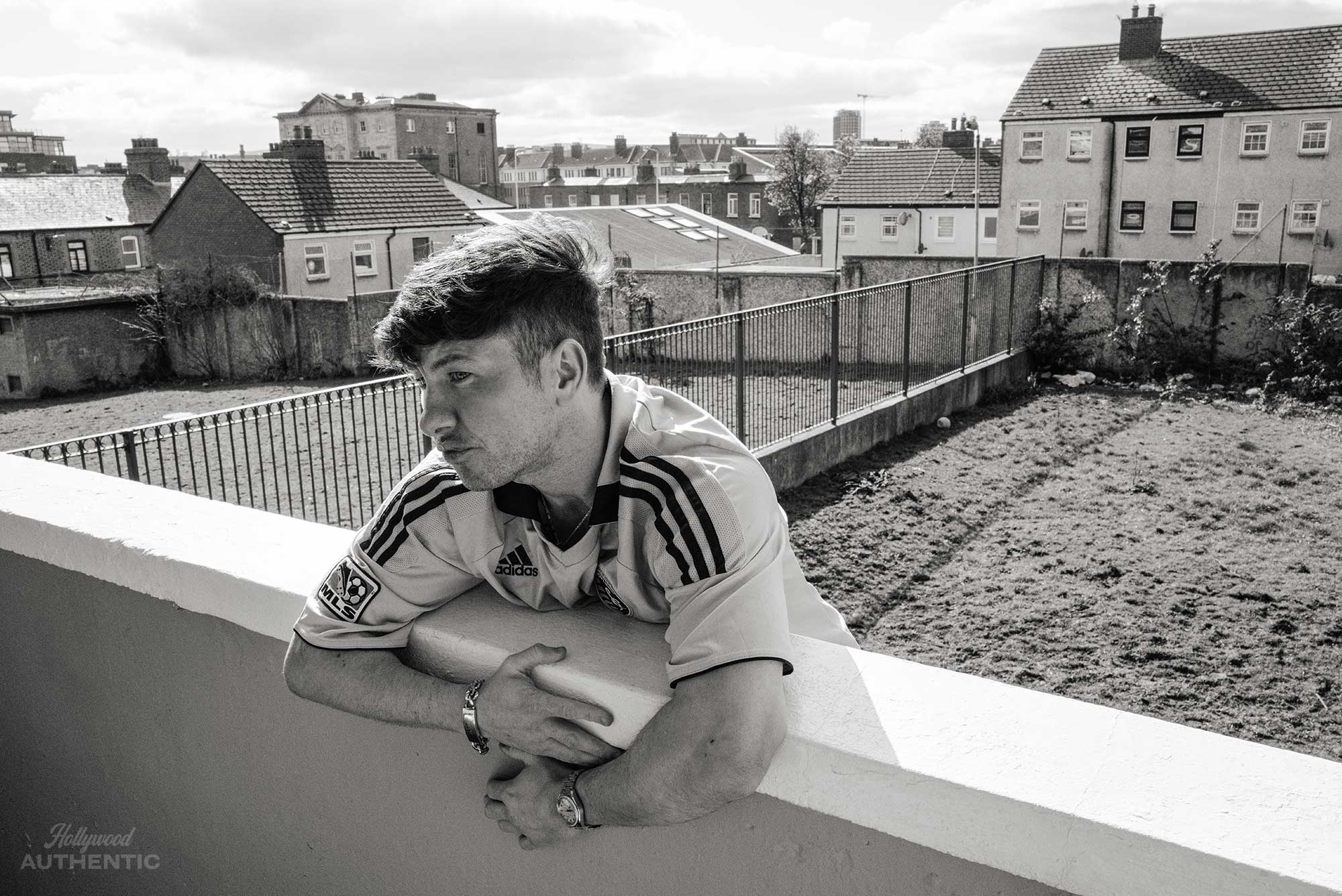
When I said I wanted to be an actor, I wasn’t taken seriously. It was more like, ‘OK, we’re going to send you to study drama and all that.’ I went, ‘But that’s not what I want to do. I want to do practical… That is my Plan A. I don’t have a Plan B’
Barry kisses his Nannie goodbye and we go outside to the balcony that runs along the flats, where he used to climb up when locked out of the main front door at the bottom of the building. ‘I’d climb onto other people’s balconies that had parties.’ He clambers over the side now for old time’s sake and tells me how everyone used to know where he lived from the green scuff marks on his trainers from scaling the green-painted railings. Everyone knows where he’s from now, greetings are shouted across the flats, balconies and from the street. ‘Baz’ from Summerhill waves back.
We head back out into the street, where Barry meets old friends, a long-lost cousin and kids he used to grow up with. They discuss their lives before we head back into central Dublin to the Cineworld Cinema where he spent many hours dreaming in front of the screen. ‘This is the main cinema I used to go to, on the mitch [ditching] from school. Every week. Like twice a week.’ He points out a side door where he used to sneak in, when he’d run out of money to pay. He backs up to the door, looks around, kicks the door open and dashes up the stairs to illustrate. Back in the day he got caught and was eventually barred. ‘I remember coming to the Dunkirk premiere, and getting in here, and them not knowing that I was in the film. They were like, “You’re not allowed in.” I said, “It’s my movie, though.” They were like, “No, no. You’re not allowed in.” It was a whole thing… It was just a turning point for me.’ He notes a poster featuring Robert Pattinson and an action figure of Chris Hemsworth as Thor in the lobby. ‘All the people in the cinema now, I know,’ he marvels. ‘I just worked with him,’ he says, pointing at Hemsworth.
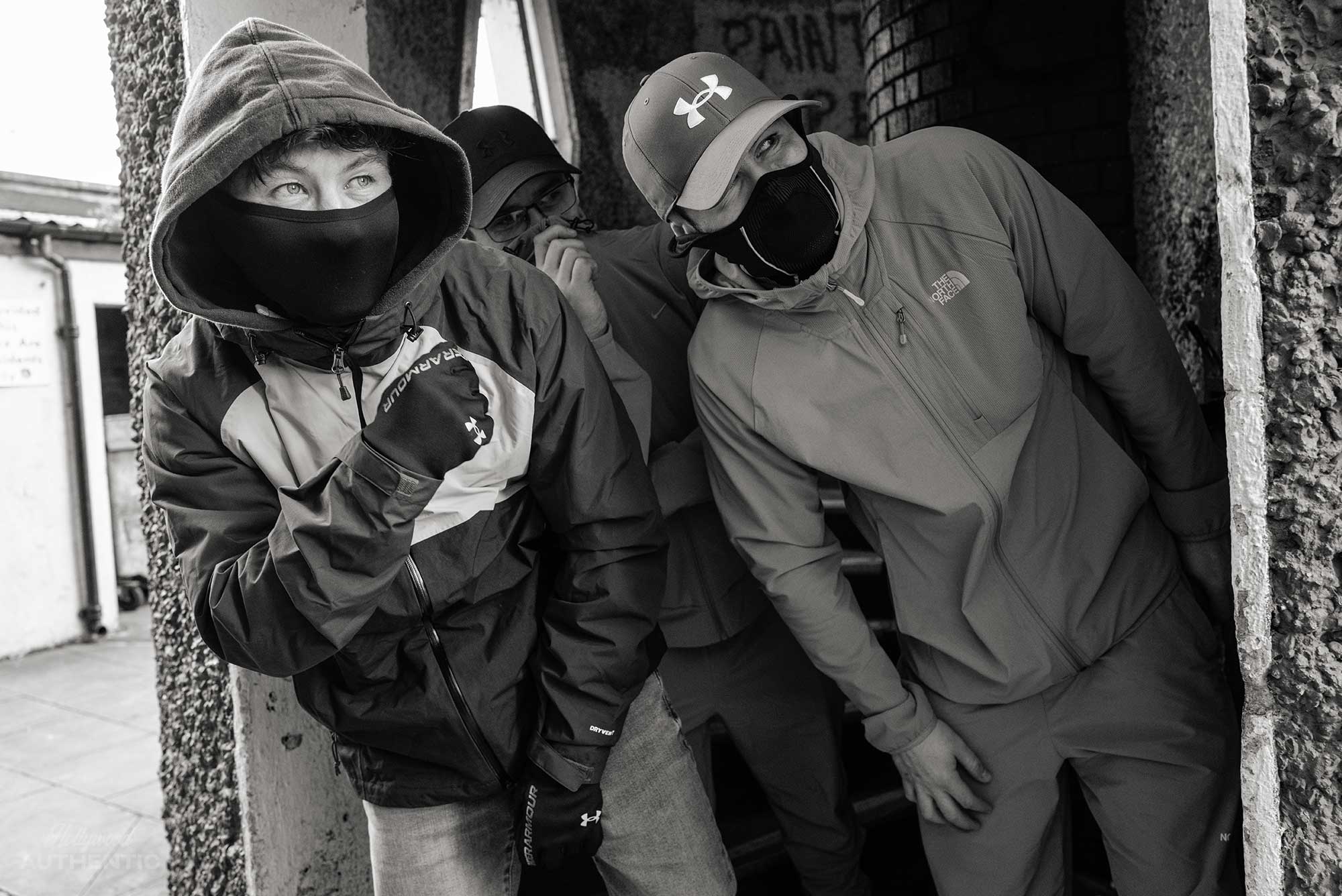
I just want people to get an insight into where I come from. I’m very proud to carry that, and for people out in the acting world and the industry to understand that there’s a lot weighing on this
As we walk through the shopping centre, Barry is approached by fans asking for pictures. He gives them gladly. I ask at what point he felt he was truly an actor. ‘I think [aged] 24. Dunkirk and Sacred Deer. I was starting to really work with really strong filmmakers.’ Those experiences have shaped what he wants to make going forward. He’s currently prepping to play Ringo Starr for Sam Mendes’ quartet of Beatles biopics. ‘I’m trying to let my hair grow for The Beatles, isn’t it?’ he says. ‘I’ve been drumming for five months. I’ve got a lot of similarities to Ringo. You know, his story is absolutely beautiful. I felt he was always an outsider trying to get in, even with the lads. I can resonate with that. He always wanted approval, and – almost – to be loved. It’s heartbreaking, the script that I read. It’s gorgeous.’
He tells me that he always immerses himself in a character to prepare for a role, namechecking actors such as Daniel Day Lewis, Christian Bale, Marlon Brando and Ben Mendelsohn as artists he admires. ‘Now that I’m in a healthy place I can constructively go to places, creatively and artistically, in a way that I couldn’t before. I can leave it there and put it to bed rather than erratically reaching for some sort of raw emotion to bring to the screen and not knowing what to do with it afterwards. I always took it seriously, but now I’m able to really constructively go there, to a place that I’m at peace with. I’m constantly trying to elevate as an actor and to prove myself. I always say the only person that stands in my way – and this is for everything, not only acting or performances – is myself, when self-doubt creeps in. I put my own obstacles in place. No one else is responsible for me achieving or getting to a place of contentness or success. The only person that is responsible for that is me, and I’ve learned that in the course of sobriety.’
He’s also part of the cast of Crime 101, where he worked alongside Hemsworth, Halle Berry, Monica Barbaro and Mark Ruffalo for his American Animals director, Bart Layton. And in May, he’ll appear in Abel Tesfaye’s (AKA The Weeknd) psychological thriller, Hurry Up Tomorrow, inspired by the singer’s January-released album. Keoghan and Jenna Ortega will play characters orbiting a fictionalised version of Tesfaye as he struggles with fame, expectation and existential crisis.

‘I play Lee, his manager,’ Barry explains. ‘It’s taking The Weeknd, with his name and who he is, and looking into the life of Abel – the madness, the pressures. We’re getting an insight into an artist of his calibre, fame and stature. It’s not all glitz and glamour, or what it seems to be. It can even be a little tougher because you’re trying to remain private, and live up to this mythical name, and this legendary status, and you can’t show any weakness or any vulnerabilities. The film humanises him – and getting to work alongside him, I got to see him go to places that not a lot of people go to, or try to reach. It’s looking at what we can all relate to as not only artists, but as humans. But for anyone involved in the industry, we certainly will be able to relate to it. Definitely.’ Will it make fans think about how they interact with artists? ‘Yeah, artists and actors and musicians – we do have feelings.’ Working with a music phenomenon like Tesfaye must have also been great prep for playing Ringo. Barry laughs. ‘Definitely! Getting to hang out with him, and go over and eat dinner with him on Christmas Day, and to chill out, and then see the world and how they see Abel. And what I want to bring forward in playing Ringo is the humanising aspect. Have I met him? Not yet. I do plan on it. But he’s such a legend.’ He mentions how Starr accidentally announced that Barry was playing him before official confirmation was made. ‘That was such a Barry thing to do, letting that news out,’ he chuckles. ‘That’s why I think we’re kind of perfect in that world together.’ The proper announcement came at Las Vegas Cinemacon after we meet in Dublin. I ask Barry a few weeks later how the experience was of standing as the Fab Four on stage with Paul Mescal (Paul), Harris Dickinson (John) and Joseph Quinn (George). ‘We all had a moment backstage and it was so, so beautiful. It was such an exciting thing, to step out and be announced as The Beatles.’
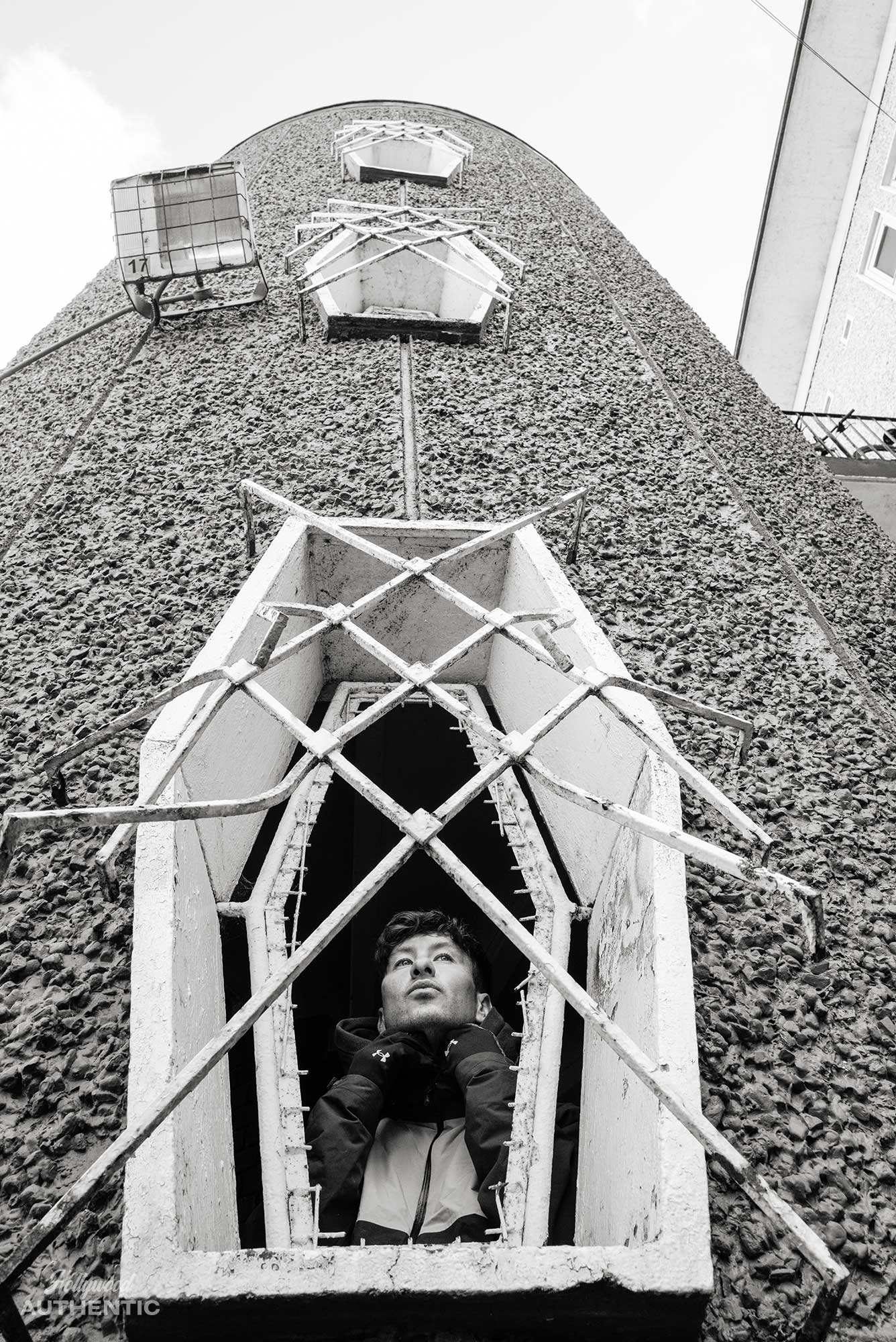
For now, he’s wrapped on the upcoming Peaky Blinders film and flexing his producing muscles with his production company, Wolfcub, with his old friend and producer, Desmond Byrne. ‘It’s called Wolfcub, because Keoghan means “wolf cub” in Irish,’ he smiles. The company is co-producing a prequel to Top Boy, set in Dublin and opening up the background of the character he previously played in the show. ‘I felt the character had more to talk about, and more to say. To show you that these boys that you met today – just even one or two – they have charm, and they look innocent. But there’s an edge there, you know? I wanted to do that with the character.’ Wolfcub is also producing Billy the Kid with Ed Guiney, and a Manchester United project. ‘Ed Guiney’s Element Pictures, and Josey and Margot Robbie’s LuckyChap – they’re the sort of companies I want to follow, making good quality, really well-written movies with strong filmmakers.’
As we walk further we discuss social media – something Barry once embraced but has recently deactivated after a tough time in the court of keyboard warriors in the wake of his break-up with the singer Sabrina Carpenter. ‘There was just so much on social media that wasn’t real. You know, we’re all going to check it. Anyone that tells you that they don’t check or search their name – they’re just telling absolute pony. Because we do. Us, as actors, we want to know to a degree what’s being said, and reviews, and whatever. But I was just getting an awful lot of slander. I can deal with that, and I can deal with people attacking my life… and then just more came from it. There were people knocking on the door where my boy lives. There were people at my nannie’s house. I just found it very unfair. So I released a statement, and I came off Instagram.’ He smiles wryly. ‘For me, Instagram was a place where I was finding validation, and looking for that validation – false validation. Posting selfies and pictures of me in the gym. And I was like, “Why am I doing this?” I was searching for this dopamine hit that you get from sharing selfies. People appreciate you as an actor when they can’t really put two and two together, and they get more immersed in your roles, and they can lose themselves in your characters. They can’t go, “No, he does this from Instagram.” For me, it was getting that mystique back, and also not needing that assurance anymore from strangers. I find myself looking up more. I find myself involved in my work more. I find myself present and engaged more. And, certainly, people don’t have a judgement on me anymore because they’ve nothing to base it on, on Instagram. They meet you for who you are.’
We’re nearly at the end of our walk. The light is fading in Dublin and it’s time to return to the hotel. As we walk, we arrive at the 123 bus stop and he pauses next to it. He’s remembering something else. ‘So this bus stop – we used to wait here. It was two €2.20 to ride the bus. So I always leave €2.20 on my mum’s grave, even now. Because I used to go to an acting workshop on it. I’d wait long nights for that bus.’ As if manifested, the 123 rounds the corner, heading towards us, slowing down for possible passengers. Barry smiles. He won’t be taking this one…
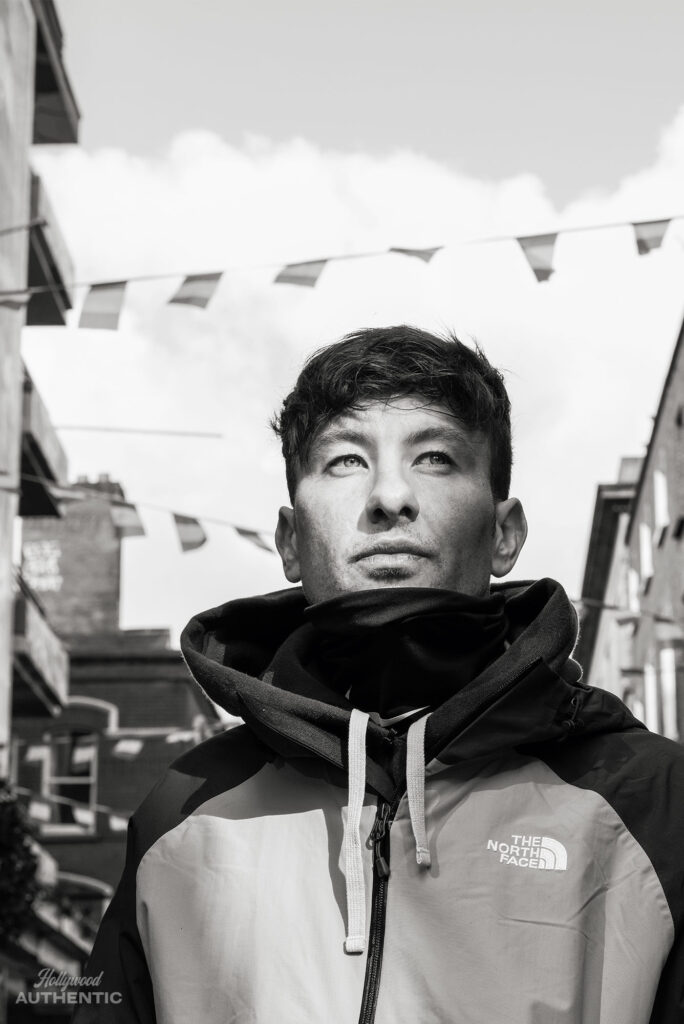
Hurry Up Tomorrow is in cinemas from 16 May. Grooming: Charley McEwen at The One Agency


